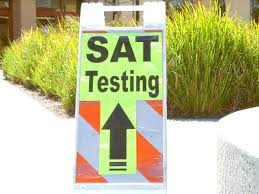
Today's topic: Score Choice
The College Board's decision to give SAT test takers the power to choose which test score they want to send colleges after they've taken the test multiple times was reportedly based on the desires of students. No surprise there--the College Board is always looking for happy customers, especially after their latest set of embarrassments in recent years. According to the New York Times, "the College Board surveyed more than 3,000 high school students from a range of income groups and ethnicities...It also surveyed 700 counselors from a diverse group of high schools across the country, and 70 percent favored Score Choice..."
This is a policy designed to make a certain set of consumers happier. It might surprise some to know that 50% of all SAT test takers repeat the exam, with 10% taking it 3 or more times (source). There is an empirically proven tendency for students to get higher scores when they retake the test.
But Score Choice will help to secure additional advantages for the already-advantaged kids. An analysis by Jacob Vigdor and Charlie Clotfelter reveals that several groups are more likely than others to retake the test: "those with low initial scores, women, Asian Americans, those who rate themselves as average or below in ability, and those who live in less affluent, rural, or predominantly black neighborhoods." As the authors state, "On their face, these simple correlations seem to dispel any notion that retaking is the exclusive or even preponderant domain of the affluent or urbanized." Good news, right?
Well, not so much. Vigdor and Clotfelter's multivariate models show that "the effect of holding constant previous scores and other variables is to reveal that retaking is indeed associated with greater affluence and parental education, among other things... Those whose parents made more than $60,000 had a 1.5 percentage point higher probability of retaking the test than those whose family incomes were below $40,000. Conditional on taking twice, applicants from these higher-income families were between 3.3 and 7 percentage points more likely to take the test a third time."
We shouldn't be surprised. Not only does the test come with direct costs (which, yes, can be waived if one knows that is available), but also incurs the opportunity costs of time spent sitting through the exam instead of doing other activities (such as working, or helping the family). Taking the test more than once requires knowing that such an option exists, and taking advantage of Score Choice requires similar kinds of knowledge. And college preparation (courses, and more informal activities) are unevenly distributed.
I don't doubt there was student demand, but while the description of the College Board's methodology implies that low-income kids wanted Score Choice as well, it is misleading. We do not know the percent of survey respondents who were low-income, nor do we know whether the stated preferences of poor kids differed from those of more advantaged kids. Furthermore, since when do high school students dictate what kinds of information about them get sent to colleges?
Don't get me wrong, I'm not in favor of the SAT- I don't think it predicts college success particularly well, and it acts as a gatekeeper. But I think if you take the tests, your schools should be shown to your college if the college wants them-- all of them.
No comments:
Post a Comment